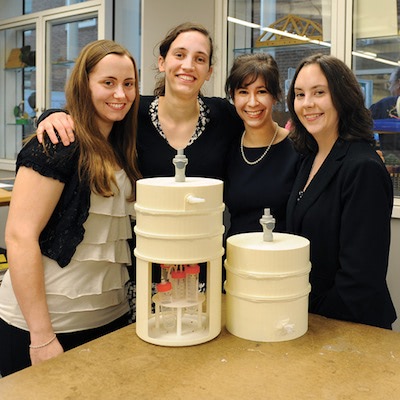- Undergraduate
Bachelor's Degrees
Bachelor of ArtsBachelor of EngineeringDual-Degree ProgramUndergraduate AdmissionsUndergraduate Experience
- Graduate
Graduate Experience
- Research
- Entrepreneurship
- Community
- About
-
Search
All Thayer News
Dartmouth undergraduate engineering students win first prize...twice!
Aug 14, 2013
A team of Dartmouth Bachelor of Engineering students—self-described as the "Fecal Microbiota Transplantation (FMT) group"—have won first prize in not one but two national competitions: NCIIA'S BMEStart biomedical design competition for undergraduates and NIH's Design by Biomedical Undergraduate Teams (DEBUT) Challenge.

l to r: Taylor Gray '13 Th'13, Jennifer Freise '12 Th'13, Pauline Schmit '13 Th'13, and Alison Stace-Naughton '11 Th'13. Photo by Karen Endicott.
Team members Jennifer Freise ’12 Th’13, Taylor Gray ’13 Th’13, Pauline Schmit ’13 Th’13, and Alison Stace-Naughton ’11 Th’13, won $10,000 from the DEBUT Challenge, and, with Sharang Biswas ’12 Th’13, another $10,000 from the BMEStart competition. The project, sponsored by Pureflora, is a device that aids treatment of the intestinal pathogen Clostridium difficile (C. diff) by creating a closed system for handling donor stool samples for intestinal transplantation. The invention was their capstone project for ENGS 89/90: Engineering Design Methodology and Project Initiation/Completion and built on prior ENGS 89/90 work by Peter Ankeny ’12 Th’12, Alex Engler ’12 Th’13, and Will Hart ’12 Th’12.
NCIIA's BMEStart competition recognizes undergraduate excellence in biomedical innovation to "stimulate the invention of medical technologies and devices that are adopted as clinical solutions."
The NIH competition "was based on four criteria: the significance of the problem being addressed; the impact on clinical care; the innovation of the design; and the existence of a working prototype."
“The success of the FMT team is a shining example of what engineering education is all about," said Karl Griswold, the group's faculty advisor. "Being a talented engineer is so much more than just getting an 'A.' This team didn’t stop at the end of the term. They took it upon themselves to find opportunities to push their project beyond the realm of academic exercise, winning two national biomedical engineering design competitions in less than 6 months. What an inspiration to see our students competing with teams from world renown biomedical engineering centers and coming out on top!”
"As a team, we decided to enter the national competitions because we thought our project fit the description of what they were looking for well," said Stace-Naughton. "I spent most of the weekends during spring term finding competitions, writing proposals, getting letters of recommendations, and communicating with my team. In the end, we submitted an application we were proud of, but I never expected to win—it was a huge surprise! What an honor and great opportunity to further explore this project. We are excited to see where it goes and continue with the engineering development. We are also very grateful for the daily support from Thayer, including our faculty advisor Professor Griswold."
The prize money is to be shared among the team members who will be honored at an award ceremony during the September 2013 annual meeting of the Biomedical Engineering Society (BMES) in Seattle.
Project Description
C. diff is an infectious intestinal pathogen, responsible for a rise in hospital-acquired diarrhea in recent years. At its worst, C. diff is drug resistant, highly virulent, and potentially deadly. While antibiotic treatment is the current standard of care, it leaves much to be desired—patients receiving this treatment have a recurrence rate of 35%, which can lead to 3.2 billion USD in healthcare costs per year in the US. One highly effective, yet frequently overlooked therapeutic option is fecal mircobiota transplantation (FMT), which harnesses the power of the body's naturally protective microbiome against the toxic effects of C. diff. We aim to bring FMT to the mainstream clinic by introducing a novel collection and isolation system that will optimize the process within a closed environment, mitigate cleaning difficulties, and reduce human exposure to fecal pathogens. Therefore, our novel device is a standardized filtration system that separates viable bacteria from the insoluble waste in stool within a closed system.
For contacts and other media information visit our Media Resources page.
